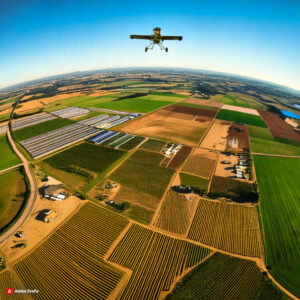Crop productivity and food supply chain modelling using Machine Learning and Remote Sensing
Crop productivity and food supply chain modelling using Machine Learning and Remote Sensing
Predicting future crop production and the functioning of associated supply chains is a significant and timely challenge. Changing climates and major societal stressors, such as COVID-19 and the invasion of Ukraine, have an impact on food availability and/or prices across the globe. This project develops and uses crop and supply chain modelling in order to improve assessments of future food availability.
Crop productivity modelling has a long history, with regional-scale crop-climate modelling becoming increasingly used to assess the impacts of climate variability and change. The General Large-Area Model for annual crops (GLAM; Challinor et al., 2004) is one such model. As an alternative to process-based modelling, the very latest developments in crop modelling use Machine Learning (ML) with remote sensing, in order to improve accuracy. This is an active area of research at Leeds and significant progress has already been made (see e.g. Droutsas et al., 2022).
Agri-food supply chain modelling has traditionally looked at management within supply chains, but has not to date not taken a holistic dynamical view of the whole chain. A holistic view would capture a range of processes: interactions between positive (e.g. increased demand) and negative (e.g. food scares) processes within the chain; timescale differences in crop growth and supply; and the effect of import/export balancing in light of crop yields (Bryceson & Smith, 2008). This is an active area of research at Reading. The models consider both between and within sector differences. They are being formulated using the theory of nonlinear ordinary equations and they are informed by data from industry.
The AFCMs are being integrated with the GLAM model to inform predicted wheat yield in the UK and in specific international regions, accounting for seasonal weather variation and climate change (up to 50 years) in doing so. This work is part of the HiFi project, which is developing a high fibre white loaf, and which funded by Funded by a BBSRC Food Systems Programme grant. It underpins the progress that will be made as part of the studentship.
The scope of the studentship is initially broad, within the areas of crop and supply chain modelling. The student will be able to follow their area of interest, including having a significant say in the geographical area of study. Two particular countries stand out as having especially high potential:
Kenya is the focus of multiple projects at Leeds, particularly on crop modelling and remote sensing. Here, there is potential to develop a sector level (farmer, distributor, consumer) supply chain model of maize in Kenya, accounting for local consumption and export. The model will be informed using publicly available data and yield predictions from the GLAM model simulations, thus resulting in an integrated crop-climate-supply-chain model for maize that draws on remote sensing to improve accuracy.
The UK is the focus of the HiFi project and it is for the UK that the ML version of the GLAM crop model has been developed (Droutsas et al., 2022). This model will be integrated with the sector-level supply chain model of UK wheat supply from the Hi-Fi project. The results from this work will inform the supply of UK produced normal and fibre-rich white flour, which will feed into the supply chain work in HiFi. A focus on the UK could feed in to government-level plans for monitoring UK food: in the summer of 2024, the UK Government began a processes of live monitoring of UK food security, via the new index system, UK-FSI[1]. The work of this studentship has potential to develop UK-FSI into a more quantitative monitoring and prediction system.

References
Bryceson, KP & Smith, CS. Abstraction and Modelling of Agri-Food Chains as Complex Decision Making Systems. 110th EAAE Seminar on System Dynamics and Innovation in Food Networks, Innsbruck-Igls, Austria February 18-22, 2008.
Challinor AJ, Wheeler TR, Craufurd PQ, Slingo JM, Grimes DIF (2004) Design and optimisation of a large-area process-based model for annual crops. Agricultural and Forest Meteorology, 124, 99-120.
Droutsas, I, Challinor, AJ , Deva, CR et al. (1 more author) (2022) Integration of machine learning into process-based modelling to improve simulation of complex crop responses. in silico Plants, 4 (2). diac017. ISSN 2517-5025Recruitment timeline for Oct 2025 (1)
[1] https://www.gov.uk/government/publications/uk-food-security-index-2024/uk-food-security-index-2024
